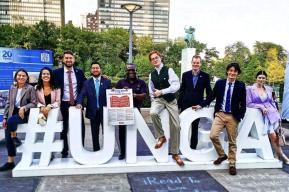The real secret to success is an eagerness to learn and to have access to knowledge, experience, and expertise of others. This is what is being offered by the UNESCO Project “Technical and Vocational Education and Training (TVET) Program for Lebanese and Syrian vulnerable youth affected by the Syrian crisis in Lebanon” to the young entrepreneurs, who undergo first a professional and technical training funded by the Norwegian MOFA and implemented by Safadi Foundation in the fields of sewing, cosmetology, assistant chef, waiter and mobile maintenance; then, in order to develop their business and entrepreneurial skills, the participating youth benefit from business skills training, which will help them build a vision for a sustainable enterprise that will cater to their personal and financial needs, while positively contributing to their community’s well-being. Successful projects will be selected for an in-kind funding, which will consist as a first step toward the beneficiary’s financial independency.
20-year-old Jana Antabli joined the course of cosmetics, while hoping for a better future amid this hard situation that all the youth in Lebanon are facing. Her dream was to be financially independent. Jana proved herself while pitching her project; she was fully prepared to present her idea to open her own beauty salon, studying her strengths, weaknesses, competition, innovation, and all the risks that she might encounter. She was climbing smoothly toward success.
“I need to help my family, especially financially. And how can I help them while doing what I love? That is why I joined the assistant chef training sessions. I want to learn all the techniques to become professional and build my own business”, Cedra Moustapha said.
The degrading financial crisis, which hit all Lebanon, was starting to become a heavy burden on Cedra Moustapha Hajj Moustapha’s family. That is when Cedra decided to join the assistant chef training. A young Lebanese girl with a lot of dreams, she was insisting on success thinking about herself and her family.
Cedra worked hard on her project, she believed in her capacities translated into enormous effort to present the best she can. Her dream to have her own cooking project was guaranteed by equipping her with the skills and materials needed to ensure her success.
Maher Othman, a young ambitious Syrian has dreamt since a long time ago of having his own business in the food industry, to support himself and his family. Maher considers the training as the first step and he knows that, without eagerness, he will not succeed, and this is what is pushing him to give more, and eventually successfully reaching the phase of entrepreneurship.
Maher has also received the support of the community due his respectfulness, honesty and easy-going personality. His dream of opening his own kiosk became a reality due to his seriousness, enthusiasm and diligence.
24-year-old Riham Sharafeddine was always fascinated by the many aspects of the sewing field. From recycling to designing to implementing, she considers sewing to be essential. Searching for a chance to provide for herself and family, Riham joined the sewing training hoping to make a living from something she really loves. All the challenges faced during the implementation of the training, from road blockage to the degrading security situation and the lockdown imposed due to COVID-19, did not restrain her from always being present whenever the course was ongoing.
Since the project’s first aim is to develop and improve employability, some of the youth that didn’t have the entrepreneurial mindset were offered a different path, in order not to leave anyone behind. The targeted youth were encouraged to undergo a professional internship that will shape the knowledge they have received during the courses, and equip them with additional skills fully preparing them for the world of work.
The trainer and owner of the cell shop (Prof Cell), Ahmad Raad was very satisfied and was even referring to an employment opportunity if the situation gets better, knowing that the youth are well prepared and require less supervision than any new hired employee. His engagement sprung from his corporate social responsibility and his willingness to support youth when it comes to introducing new initiatives.
The youth, who were practicing their skills at “Manar Ajami haute couture”, praised the courses that they took, stating that the curriculum was complete yet not enough. They noted that the internship phase was critical to fully prepare them, as, in addition to the acquired professional skills they were taught how to work under pressure while focusing on the smallest details.










